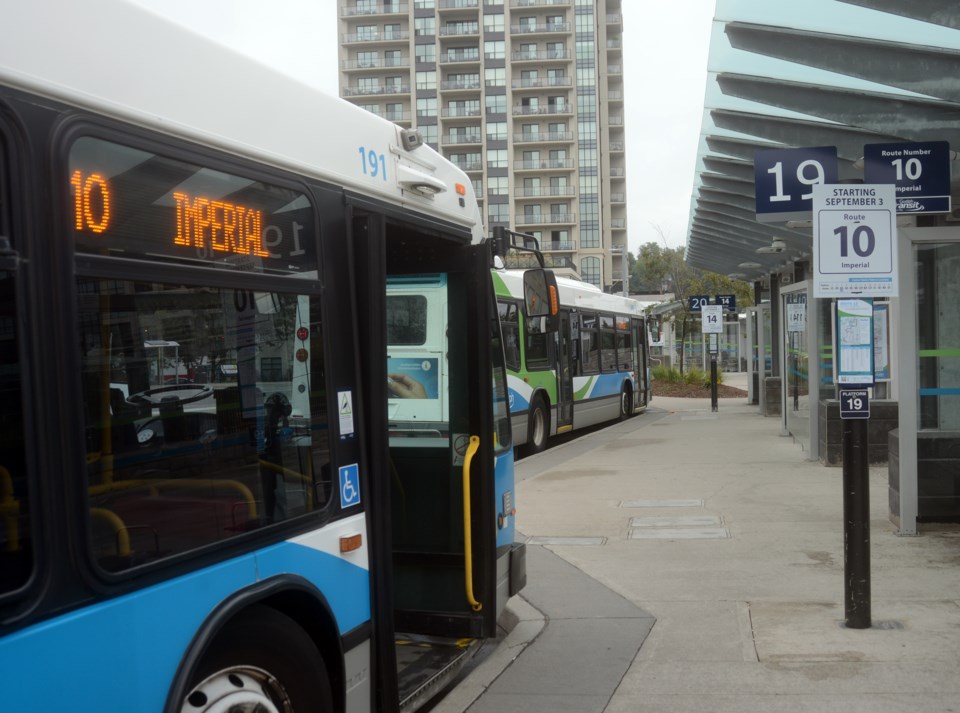The first cash fare raise in seven years could be coming to Guelph Transit, along with a series of new and expanded discount programs, including making the Kids Ride Free program permanent.
Those are among the recommendations heading to council’s committee of the whole next Tuesday as part of the city’s fare strategy update. Any decisions made that day would need to be ratified by council during a later meeting before they could be implemented.
The strategy includes a proposal to increase the cash fare from $3 to $3.25 beginning in September, with the same rate for tap debit and credit card payments which will also be allowed.
It’s proposed that the cash fare price rise by 25 cents every two years beginning in 2026.
The last cash fare increase was implemented in 2016.
“Guelph Transit has made many service enhancements since the last fare increase, such as expanding route 99 Mainline Sunday service hours, increasing midday frequency on several routes, and reinstating conventional service to the Hanlon Creek Business Park,” the strategy report states.
“Regular increases in fares will allow Guelph Transit to continue to make service enhancements and provide additional support for upcoming capital projects, such as new shelters at Guelph Central Station as well as digital signs at the University of Guelph bus loop, Guelph Central Station, and Stone Road Mall.”
No immediate change is planned for the cost of travel paid online, which is $2.80 for adults.
The Kids Ride Free program, which offers no-fee rides for children age 12 and younger, was set to expire at the end of February. However, during 2023 city budget confirmation talks in January, city council agreed to extend the program until the fare strategy was completed and a recommendation presented to council.
It’s now proposed to be made permanent.
The program, which was implemented as a pilot project on March 1, 2022 and was used more than 10,000 times in its first seven months, comes with an anticipated $117,000 revenue loss for 2023, along with $38,100 in operating costs.
A series of new or expanded discount initiatives are also proposed.
They include creation of a revised corporate pass program, a travel training effort, extension of the program that allows free rides for city employees, and conversion of the monthly pass program into a fare-capping loyalty program.
That conversion is expected to “simplify the fare structure,” the strategy states.
“Fare capping is when a rider’s total fares within a set period of times are capped at the equivalent value of an unlimited pass for the same period,” it explains. “Customers will continue to pay the same price per ride and once the customer has reached a set number of rides within a calendar month, they will ride for free for the rest of that month.”
A new corporate pass program is also planned, with an anticipated launch in 2024.
An existing version of the initiative has been in place since 2008, when it began as a pilot project for workers at the University of Guelph and Co-operators insurance.
“The new corporate pass program would allow local businesses and groups to enroll and offer monthly passes at discounted rate for their employees or group members. A business that signs up for the corporate pass program will pay for a minimum of 10 per cent of each corporate pass purchased by their employees, and Guelph Transit will pay for an additional 10 per cent, meaning employees will pay for, at most, 80 per cent of their monthly pass.”
Currently, all staff at city hall have an opportunity to ride Guelph Transit for free, while other municipal workers can get a 50 per cent discount.
The plan, as recommended, is to offer free rides to all city employees, including casual part-time workers, summer students and contract employees.
“The discounts are taxable benefits and are managed by human resources,” a staff report states. “Based on historical enrolment in the program, it is assumed the program will continue to operate with minimal financial impact.”
Overall, recommendations within the fare strategy are expected to result in a $5,200 revenue bump this year, the staff report notes. Between 2024 and 2027, revenue is anticipated to grow by another $151,900.
The cost of implementing fare capping, bank card fare payments and self-service terminals is estimated at nearly $330,000, which is planned to come from Guelph Transit’s existing capital budget.
The deadline to register as a delegate or make a written submission for council to consider during its April 4 committee of the whole meeting is this Friday at 10 a.m. To register, visit guelph.ca/delegation, call 519-837-5603 or email [email protected].
